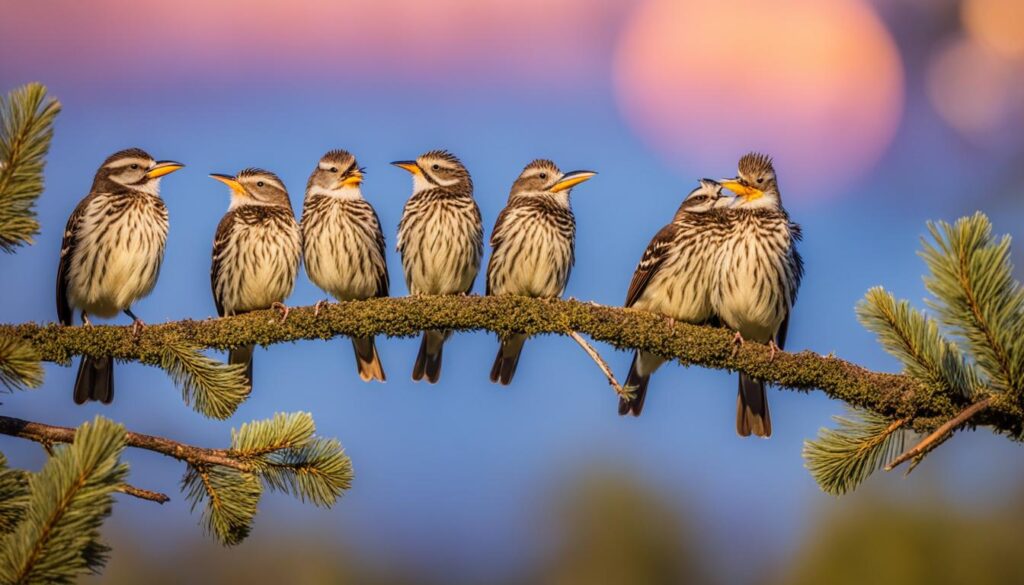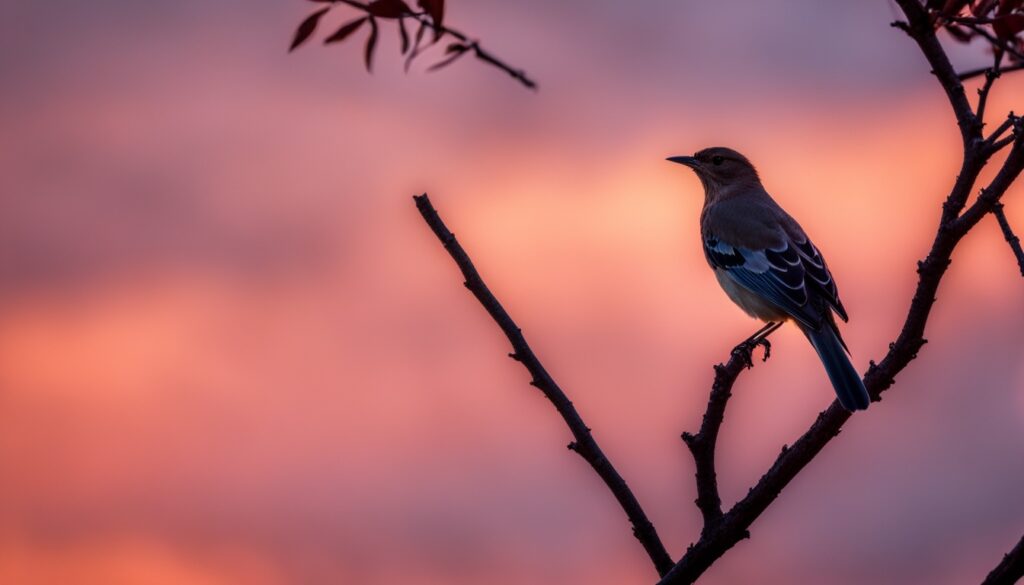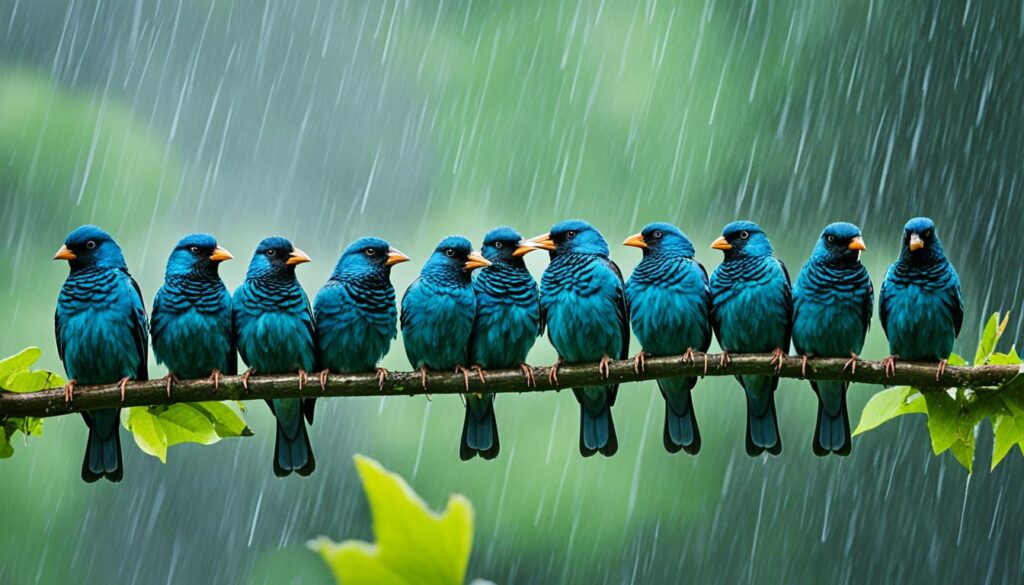Birds chirping and singing at the first light of dawn captivate us. Ever wondered what starts this early bird phenomenon? It’s all about the birds’ sleep and singing habits, which act like an alarm clock set by nature. They sing early because of changing light and temperature.
About an hour before sunrise, the dawn chorus begins. This is when all the birds sing together. They do this for good reasons, like finding a partner or protecting their space. Knowing why they sing early helps us understand and admire these little singers even more.
Key Takeaways
- Birds usually start singing 1-2 hours before sunrise, with the dawn chorus peaking around 30 minutes before dawn.
- Male birds sing early to attract mates and signal their strength to rivals, as it takes significant energy and resources.
- Bird songs carry better in the quiet, still air of early morning, allowing for more effective communication.
- Light pollution and noise from human activity can cause birds to start singing earlier than their natural rhythms.
- The dawn chorus is most vibrant in spring and summer during the breeding season.
What Time Do Birds Wake Up?
Birds are up early, starting their songs about 1 hour before the sun rises. This happens most during spring and early summer. Birds like robins and blackbirds are the first to chirp. They’re soon joined by other birds in a beautiful symphony.
Robins can start singing up to 80 minutes before sunrise, and blackbirds up to 70 minutes early. Common bird, the song sparrow, wakes up 30 to 60 minutes before sunrise. On the flip side, nocturnal birds such as owls wake up early too. They align their singing schedules with their nighttime hunting.
Most birds match their wake-up times with the sunrise. They adjust as seasons change, so in summer, they start their songs earlier. Yet, the beautiful morning songs can last well into the morning. This offers a great chance to hear their songs.
Robins, Blackbirds, and Song Sparrows
- Robins wake up up to 80 minutes before sunrise
- Blackbirds wake up up to 70 minutes before sunrise
- Song Sparrows typically wake up 30-60 minutes before sunrise
The dawn chorus of birds is not just at sunrise. It can continue for hours after the sun comes up. This is good news for those who love listening to birds.
“The dawn chorus is mostly made up of male birds, aiming to attract mates and establish territories.”
The time birds wake up is linked to their internal body clocks and light levels. Knowing when they sing helps us value these early morning concerts. It shows us the incredible nature of the birds around us.
The Dawn Chorus Phenomenon
The dawn chorus is a captivating aural spectacle that occurs in the early morning hours, usually before sunrise. It lasts for several hours. This is when wild birds sing together, creating a beautiful and unique symphony. It usually starts with birds like robins, blackbirds, and thrushes. Then, more and more birds join in until the whole neighborhood seems alive with their songs.
Birds have internal clocks that match the day and night cycle, called circadian rhythms. This makes them start their mornings early. Being day-active creatures, they want to start their day before sunrise. This helps them find food and do other important activities.
This beautiful chorus is found in many places and times. Weather, the time of year, and where the birds live affect when they start singing. In general, the loudest singing happens in the spring, from April to June. This is when birds are most active and looking for mates.
For those interested in birds, the dawn chorus is a special time. You can see the sun rise and hear birds sing. Remember to go to the right place, bring binoculars, and learn the basic bird songs. Being calm and patient is key to enjoying this experience fully.
“The dawn chorus is a diverse experience across different bird species, with varying wake-up times and unique songs. It’s a natural symphony that can be enjoyed from the comfort of your backyard or by visiting local parks and nature reserves.”

Birds sing early in the morning for important reasons. They’re marking their territories, looking for mates, and showing off to potential partners. The quiet mornings help their songs travel far, so they can be heard better. This shows how well birds adapt and how lively the bird world really is.
Why Do Birds Sing in the Morning?
Many have heard the dawn chorus, birds singing at dawn. It’s lovely but may make you wonder why. Birds sing in the morning due to their natural biological clocks. This is tied to their need to find mates and protect their living areas.
Singing for Mates and Territories
Male birds sing mostly in the morning. They sing for two reasons: to find a mate and to guard their territory. A loud and clear song tells others that a male bird is strong. This means he is a good partner and his territory has lots of food.
Some female birds also join the dawn chorus. They do it to defend their homes. Yet, male birds are much louder in the early morning songs.
“Singing helps male birds attract mates and establish territories, signaling their fitness and strength to potential partners and rivals.”
In the early morning, it’s too dark for finding food but also too dark for many predators. This quiet time lets bird songs travel far, making it an ideal time to be heard.
Moreover, science shows that hormones play a role in the dawn chorus. At night, male birds’ testosterone and melatonin levels rise. This makes them sing even louder in the morning.
Therefore, morning singing is key for birds to find partners and protect their areas. It has been part of their life for a very long time. And we get to enjoy it as well.
Common Morning Bird Songs
At dawn, the air fills with a beautiful chorus of bird sounds. This dawn chorus includes various bird songs. Each bird adds its unique melody to the early morning soundscape.
Robins, blackbirds, and thrushes are among the first to sing at dawn. They start singing even before the sun shows up. Their songs fill the calm air with rich, flowing notes. Later, wood pigeons join in with their distinct ‘coo-coo’. Meanwhile, wrens and warblers add lively trills.
As morning progresses, the symphony of bird songs grows. Great tits, blue tits, sparrows, and finches start singing. Their cheerful songs mix together to create a beautiful morning sound. It’s a mix that soothes and energizes listeners alike.
| Bird Species | Common Morning Song |
|---|---|
| Robin | Delicate, warbling notes with pauses |
| Blackbird | Low-pitched, flute-like verses with a squeaky twiddle |
| Thrush | Confident, powerful phrases repeated up to three times |
| Wood Pigeon | Low-pitched, five-note cooing with loud wing clattering |
| Wren | Lively, trilling song |
| Great Tit | High-pitched, squeaky ‘see-saw-see-saw’ |
| Blue Tit | Short, trilling ‘sispi si-hi-hi-hi-hi’ or ‘tsee-tsee-tsee-chu-chu-chu’ |
| House Sparrow | Simple, persistent chirping for several minutes |
| Starling | Unique, experimental-sounding song with whistles, whines, and squawks |

The dawn chorus is a unique and always changing event. Each bird type contributes its distinct voice. Whether you love watching birds or just enjoy nature, the morning bird songs are truly special.
Best Time to Listen for the Dawn Chorus
During May and June, the dawn bird calls hit their peak. This is when morning bird songs are most charming. Just before sunrise, the first birds start their beautiful song an hour early.
The lovely sounds don’t stop at sunrise. Bird songs last well into the morning. This gives everyone a chance to enjoy the birdsong at daybreak and sunrise bird choruses. You can hear the best tunes of the dawn chorus around 30 minutes before and after sunrise. But, the melodies of the birds keep going all morning long.
Timing the Dawn Chorus
- The dawn chorus typically begins about an hour before sunrise.
- The peak of the chorus is around 30 minutes before and 30 minutes after sunrise.
- The chorus continues well into the morning, so you have plenty of time to enjoy the dawn bird calls and morning bird songs.
So, whether you’re up early or you sleep in, you can enjoy the beautiful birdsong at daybreak. It’s like the birds are singing to welcome a new day.
“The dawn chorus is a magical time when the air is filled with the beautiful songs of birds welcoming the new day.”
| Time | Bird Activity |
|---|---|
| 1 hour before sunrise | First singers begin the dawn chorus |
| 30 minutes before sunrise | Chorus reaches its peak |
| 30 minutes after sunrise | Chorus gradually tapers off |
| Throughout the morning | Sporadic singing continues |
Why Do Birds Sing So Early?
The dawn chorus, a beautiful symphony of birds, starts the day with its song. It captures the hearts of both bird lovers and scientists. Although it might seem early for these singers to start, there are good reasons for their choice.
The main reason is the quiet. Early mornings are serene, with little human noise. This allows bird songs to spread far and wide, reaching more ears. They can be up to 20 times louder in the calm of early morning, over their daytime volume.
In the dark of early morning, birds don’t hunt. This means they have time for their vocality. Singing helps them find a good partner and protect their home. As the daylight breaks, the songs get stronger and more dynamic, showing off their best voices.
“The dawn chorus is the collective twitterings, tweetings and chirps of wild birds in the early morning hours, typically starting before sunrise and lasting for a few hours.”
Early singing was thought to be for better sound spreading. But, recent studies found that birds can sing just as well at noon. Still, morning songs are clearer, helping birds know who is who. This clarity is key in controlling their area and finding a partner.
The loudest part of the dawn chorus is in spring and early summer, mostly in May and June. This is the time for mating and claiming territory. As the day moves on, the chorus gets quieter, with robins and blackbirds often the last to sing.
The dawn chorus is a complex mix of needs and abilities. It shows birds making the most of their early hours. By knowing why birds sing so early, we see their amazing skills to live and find love in their world.

Identifying Birds by Their Songs
Many bird lovers find joy in the early bird calls. These morning sounds offer a lot of information about local bird life. Each male bird has a unique song. This helps its neighbors know who they are. The morning chorus is essential for these birds. It’s their way of claiming their territories and finding mates.
Birds sing early for a few important reasons. It makes their song clearer and easier to recognize. This is key for making a good impression or warning off rivals. Their songs show off their health and strength.
| Bird Species | Distinctive Song Characteristics |
|---|---|
| Mourning Dove | Soft, mournful cooing |
| Rock Dove (Pigeon) | Gentle, rhythmic “coo-coo-coo” |
| House Sparrow | Lively, chirping “cheep-cheep-cheep” |
| Common Grackle | Loud, brassy “craa-a-ack” |
| European Starling | Versatile, whistling, and chirping vocalizations |
Some bird songs, like that of the Mourning Dove, are simple and easy to recognize. But others, like the European Starling, have very complex songs. Identifying birds by their songs is a learning process. But it deepens your connection with nature.
Many tools can help you get better at recognizing bird sounds. There are field guides, apps, online sound libraries, and workshops. With these resources, you can soon learn to understand the language of birds.
Where to Listen for the Morning Bird Chorus
As the sun rises, the air fills with the beautiful sound of dawn bird calls and morning bird songs. You can hear these melodious sounds in nature, but also at home or in your own community.
To hear this dawn bird symphony, having greenery nearby is essential. Trees, shrubs, and bushes create the best homes for birds to sing from. Even in towns, if there’s enough nature where you live, you can catch these lovely sounds.
Optimal Listening Locations
- Countryside and rural areas
- Nature reserves and wildlife parks
- Wooded areas and forests
- Suburban backyards and neighborhoods with mature landscaping
- Urban green spaces, such as parks and botanical gardens
A peaceful, quiet place brings the best chance to really listen. Early mornings, with their calm air, make birdsong at daybreak echo wonderfully. In cities, a visit to a nearby park is like entering a bird orchestra.
| Location | Optimal Listening Experience | Typical Bird Species |
|---|---|---|
| Countryside | Excellent, with minimal background noise | Thrushes, blackbirds, wrens, warblers |
| Nature Reserves | Exceptional, with a diverse range of birds | Woodpigeons, waders, finches, tits |
| Suburban Backyard | Good, depending on nearby vegetation | Robins, sparrows, doves, starlings |
| Urban Parks | Fair, with some background noise | Pigeons, crows, gulls, sparrows |
The dawn bird calls and morning bird songs are a perfect start to any day. Step outside, find a lovely spot, and enjoy the sunrise bird choruses.

The Purpose of Early Morning Singing
The dawn bird calls and morning songs aren’t just pretty sounds. They’re crucial for birds. This singing helps them find a mate and protect their area.
Male birds sing loudly at dawn to show they’re healthy and strong. They aim to impress females and warn off other males. This way, they up their chances of getting a partner and keeping invaders away.
Singing in the morning is a natural part of birds’ daily and yearly routines. The best singing season is late spring and early summer. This is when most birds are looking for a mate.
“The dawn chorus might help birds prepare for social interactions with mates, potential mates, and territorial rivals.”
Not all birds sing a lot during the day. Some sing a bit all day long. Others save their big songs for the early morning. This shows how different birds have unique ways of doing things.
Morning songs are key to how birds live and grow. Knowing why they sing helps us understand the beauty and order in nature.
Circadian Rhythms and Bird Behavior
Birds sing early in the morning due to their circadian rhythms. These are their internal body clocks. They manage when birds are active and when they rest. The dawn chorus happens just before the sun rises, an important time for many birds. They are preparing for the day, including breeding and protecting their territories.
Biological clocks are vital for birds. These clocks help with sleep, wake cycles, and other activities. Birds have several parts working together to keep time, like the pineal gland and the eyes. They also have their own versions of the brain’s timekeeper, the suprachiasmatic nuclei. A variety of genes, including clock and bmal1, along with per2, per3, and cryptochromes, help birds stay on schedule.
The pineal gland, eyes, and brain parts keep birds’ daily schedule in sync with light changes outside. These parts can sense changing light levels. They produce the pineal hormone melatonin, which helps birds get ready for sleep or wake up. These areas of the brain aren’t just for timekeeping. They also help birds think and learn, especially birds known for being smart. Their sharp minds might be partly thanks to their well-tuned circadian clocks.
“Avian circadian rhythms impact cognitive processes, learning, memory, and navigation, making birds an interesting model in the study of time perception in neurobiology.”
Special brain areas, like the suprachiasmatic nuclei in the midbrain, work with the eyes to keep rhythm. At night, the pineal gland makes melatonin. This calms down the suprachiasmatic nuclei in the brain. This slows down the bird’s body, readying them for rest. It’s an amazing system that helps birds keep up with changes in light. This way, they can sing at dawn and find their way home during long travels.

Conclusion
The dawn chorus is when birds sing at the break of day. It’s lovely and shows us how birds live. They sing for many reasons like finding a mate or claiming their area.
This morning sing-along is full of surprises. From the sweet songs of songbirds to the crazy good sounds of birds like the Marsh Warbler. These sounds not only make our day but also tell us about the daily routines of birds.
It doesn’t matter if you love watching birds or just like nature. Listening to the dawn chorus is amazing. It teaches us about bird life and helps us feel closer to nature and its many creatures.
FAQ
What time do birds wake up?
Birds usually start their dawn chorus, or chirping, about 1 hour before sunrise.
What is the dawn chorus phenomenon?
The dawn chorus is the early morning symphony of wild birds. It starts before sunrise. Birds sing to attract mates and protect their territories.
Why do birds sing in the morning?
Male birds sing early to find mates and warn others away. Their songs show they’re healthy and strong.
What are some common morning bird songs?
In the morning, listen for songs from blackbirds, thrushes, robins, finches, and warblers.
When is the best time to listen for the dawn chorus?
The best time is in May and June, starting an hour before sunrise. But, you can hear songs all morning long too.
Why do birds sing so early in the morning?
Early mornings are quiet and still, perfect for singing. The less noise means their songs travel further.
How can I identify birds by their songs?
Males have unique songs that neighbors recognize. Singing loudly and early helps birds find each other better.
Where can I listen for the morning bird chorus?
You can hear it in the countryside, but also in your backyard. Anywhere with trees or bushes nearby is good.
What is the purpose of early morning singing?
Morning songs help birds find mates and show they are strong. It tells others they are the best around.
How are bird sleep patterns and circadian rhythms related to their morning singing?
Birds sing early because their bodies are ready for the day before sunrise. Their singing is part of getting ready to find mates and protect their areas.

